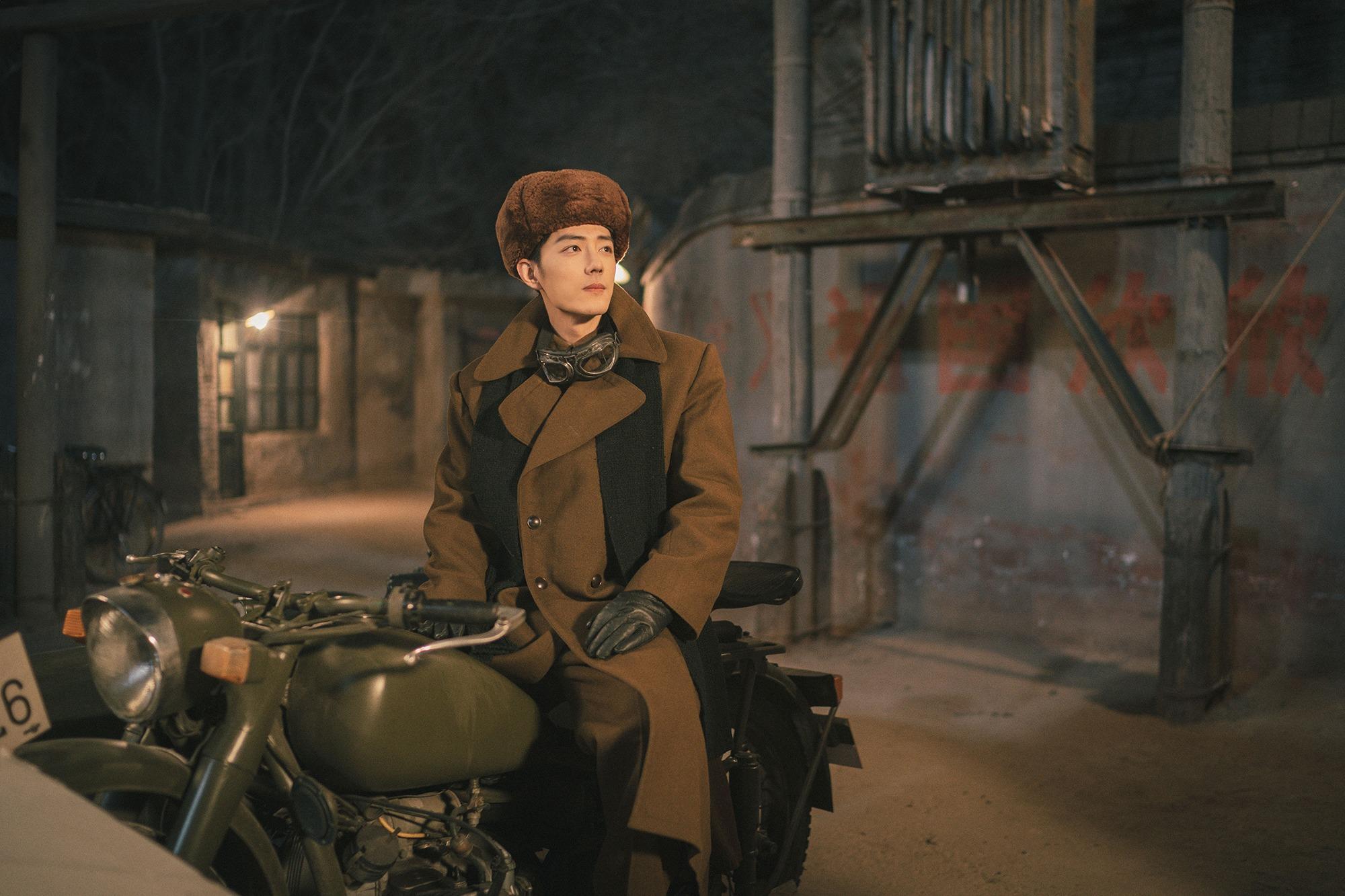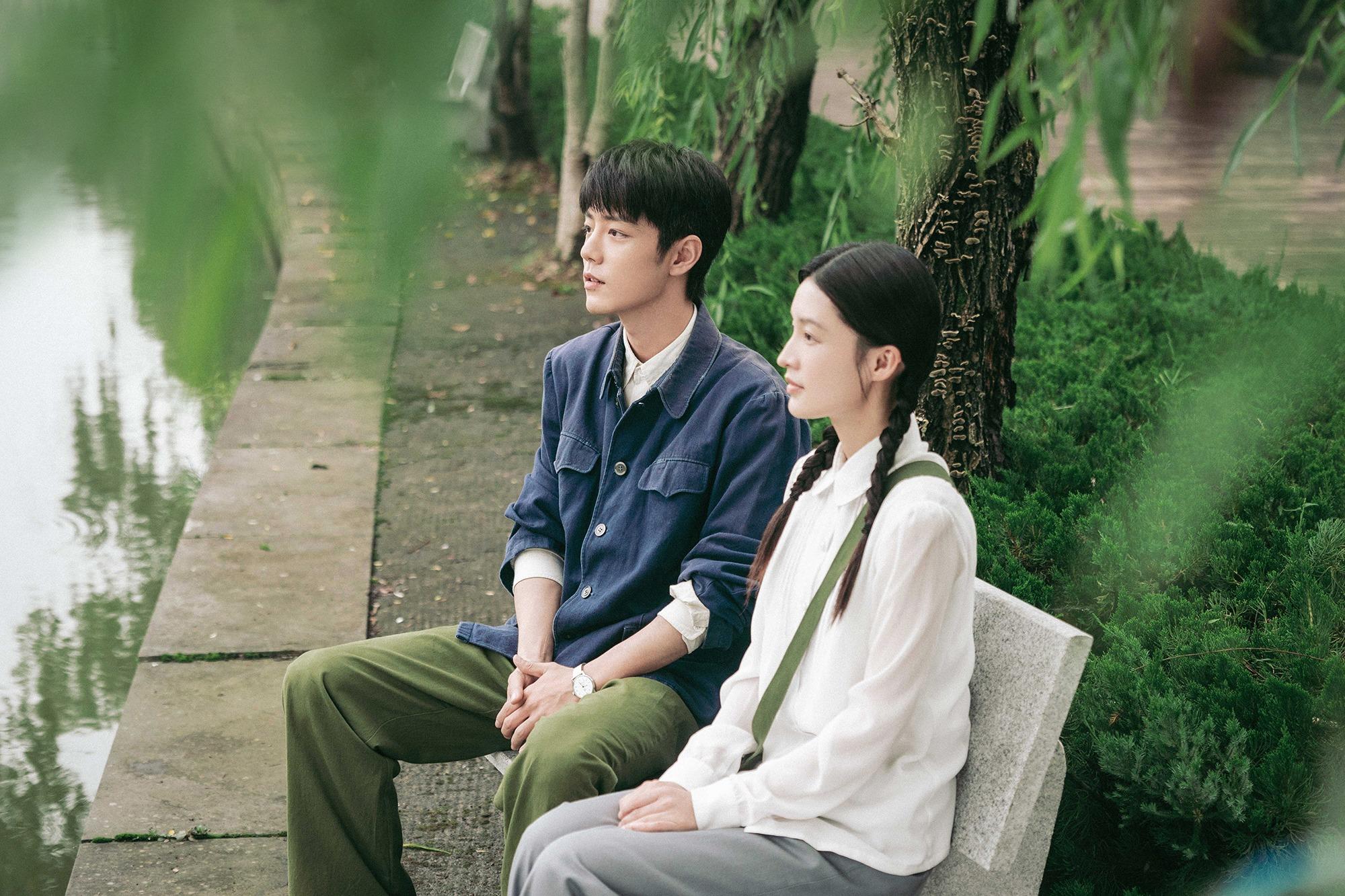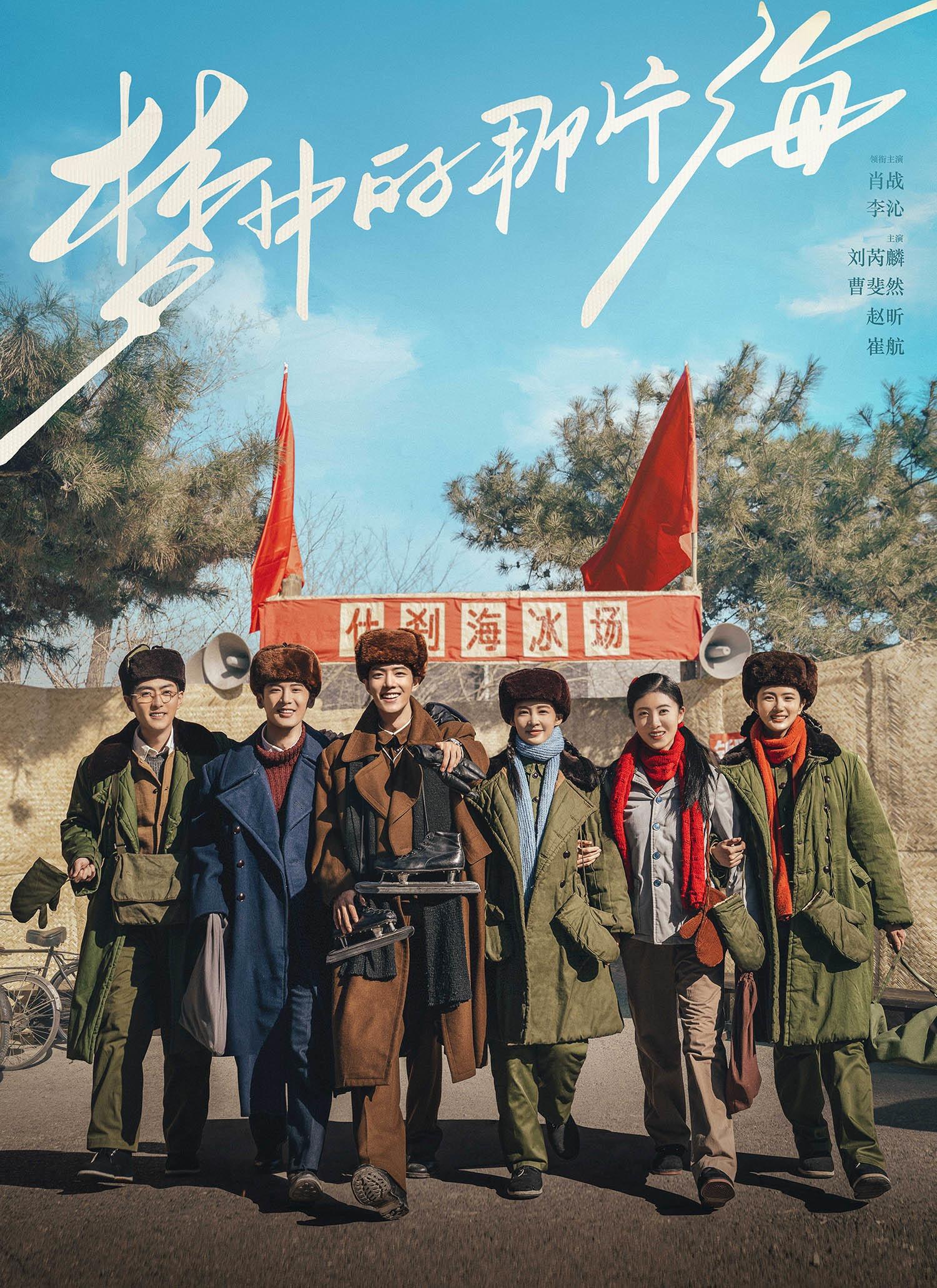TV series taps into nostalgia of bygone era and the sense of optimism that captivated China's youth in 30 years, Li Yingxue reports.
 Xiao Zhan plays Xiao Chunsheng in the TV drama The Youth Memories. (PROVIDED TO CHINA DAILY)
Xiao Zhan plays Xiao Chunsheng in the TV drama The Youth Memories. (PROVIDED TO CHINA DAILY)
As winter descends, the frozen Shichahai ice rink becomes a stage for young individuals gliding carefree across its surface. The profound contrast between the frigid ice and the passionate fervor of the young skaters creates a captivating tableau.
The youthfulness of this cohort finds its genesis in Shichahai, where their emotions and destinies will become intricately woven together. Over the next three decades, their fates will undergo a continuous metamorphosis, mirroring the relentless changing of the times.
This is the narrative that unfolds in the domestically produced drama The Youth Memories, a 38-episode television series that was broadcast on both China Central Television and Tencent Video this year.
Directed by Fu Ning and starring Xiao Zhan, Li Qin, Liu Ruilin, Cao Feiran, Zhao Xin and Cui Hang, the drama is set in Beijing in the 1970s and tells the story of a group of young people who grow up, pursue their dreams, and struggle during the early period of reform and opening-up.
This series has captivated attention since its casting and production to its on-air debut. The conscientious craftsmanship of the production team, evident in details like costumes and props, coupled with the dedicated performances of the group of young actors, has resulted in the show achieving both impressive viewership ratings and positive acclaim.
Yang Chenghu, a professor from Beijing Normal University, comments that the series not only provides a snapshot of a bygone era, but also preserves a love story etched deep within the memories of an older generation.
Through its vibrant portrayal of ambitious and dynamic young characters, it gives play to the anthem of youth, conveying profound reflections on the spirit of the times and the essence of life, Yang says.
Zhou Xiaoxiao, chief editor of the drama, says her goal is for the show to resonate with the memories of older generations, while simultaneously helping the younger generation comprehend an era where warmth and challenges coexisted.
"This isn't a documentary series, so it's impractical to comprehensively delve into every historical nuance. Nevertheless, the destinies and fluctuations of the characters undoubtedly stand as the era's most compelling testimony," she says.
"The Youth Memories serves as a poignant bridge in this regard. The personal growth that Xiao Chunsheng and his cohort of young individuals undergo throughout their journey resonates with the evolving times, encapsulating a condensed path of life."
 Xiao Zhan plays Xiao Chunsheng in the TV drama The Youth Memories. (PROVIDED TO CHINA DAILY)
Xiao Zhan plays Xiao Chunsheng in the TV drama The Youth Memories. (PROVIDED TO CHINA DAILY)
Director Fu Ning has crafted numerous TV series that unfold in the heart of Beijing. Raised in the Beijing hutong, Fu maintained a profound connection to the core narrative and the atmospheric backdrop of the depicted era in this drama.
With a stringent approach, he ensured authenticity in shaping the essence of the story and the period ambiance, striving to present a genuine portrayal of 1970s Beijing through his lens.
Yang Xiaopei, general producer of the TV series, has served as the executive producer for several renowned dramas including Legend of Fuyao, Ancient Love Poetry and Who Rules The World. The Youth Memories marks her debut in the realm of realistic historical dramas.
According to Yang Xiaopei, this drama delves into discussions on themes such as love, friendship, dreams and faith through a youthful lens, with its creative exploration that touches upon every facet of characters' lives.
"I think the drama has the capacity to resonate with audiences across different age groups," Yang Xiaopei says.
As per Yang Xiaopei's explanation, the crew meticulously studied the daily habits of individuals living in Beijing during that period to capture authentic details in props, including practices like winter cabbage storage, burning coal balls, and the presence of street vendors selling sugarcoated hawthorn.
In terms of costume design, items like batwing sleeves, bell-bottom pants, scarves and headbands authentically recreate the ambiance of that era.
To recreate the Shichahai ice rink of the 1970s, the team crafted detailed blueprints, and ultimately enclosed an area exceeding 10,000 square meters.
Yang Xiaopei highlights the involvement of over 100 members from skating clubs who served as extras. As the machines operated, they glided naturally, infusing the entire scene with a profound sense of authenticity.
This was not just a leisurely pursuit or hobby but a genuine reflection of the lifestyle of Beijing residents during that era, she says.
 Xiao (left) and Li Qin play a pair of lovers in the drama. (PROVIDED TO CHINA DAILY)
Xiao (left) and Li Qin play a pair of lovers in the drama. (PROVIDED TO CHINA DAILY)
Young actors' ambitions
The series unfolds over a span of 30 years, requiring each key actor to navigate three decades of character development. The main cast delivers a compelling performance that leaves the audience thoroughly satisfied.
During casting, Yang Xiaopei emphasized her willingness to provide opportunities for young actors, but she steadfastly avoided relying solely on popularity. She placed greater importance on the suitability of the role and the actor's genuine passion for the character.
Xiao Chunsheng's character is played by actor Xiao Zhan. Yang believes that Xiao Zhan shares commonalities with the role in both image and character.
"They both exude optimism, sincerity, uprightness and the courage to confront challenges. When combined with Xiao Zhan's profound understanding and portrayal of the character, he can be deemed the ideal choice to bring Xiao Chunsheng to life," Yang Xiaopei says.
"The integrity, kindness and sense of justice that define Xiao Chunsheng harmonize seamlessly with Xiao Zhan's simplicity and sincerity. Moreover, in terms of appearance, Xiao Zhan's stature and posture perfectly suit the role," Yang Xiaopei comments, adding that Xiao Zhan even sought out a teacher to learn the Beijing dialect.
Zhou acknowledges the outstanding performances delivered by the entire main cast. "Li Qin's portrayal of Tong Xiaomei also stands out. She is an exceptionally thoughtful actor, meticulously considering whether each plot point aligns with Tong's character, and whether it is within her capabilities to portray them." Zhou says.
"Of course, this extends to Liu Ruilin, Cao Feiran and the other young actors who, to my pleasant surprise, shone brightly. Everyone surpassed expectations, delivering performances that were truly exceptional."
Cao, 28, portrays the character of He Hongling, who shares numerous emotional scenes with Xiao Chunsheng in the drama.
Reflecting on the filming experience, Cao mentions that Xiao Zhan, with his extensive acting background, often provided valuable assistance on set. "If I did something well, he would point it out, enhancing my confidence in the process of shaping the character," she notes.
As both Cao and Xiao Zhan fully embraced their respective roles, spontaneous dialogue between them became a common occurrence on set.
Cao perceives He as a radiant, goal-driven individual with ambitions. However, influenced by her family background and the era's milieu, He is also a complex, self-interested individual living in the present, Cao adds.
 A poster for the show. (PROVIDED TO CHINA DAILY)
A poster for the show. (PROVIDED TO CHINA DAILY)
In preparation for her role, Cao learned the violin and how to ice skate before joining the production. Additionally, she sought insights into the emotional experiences of individuals from that era by consulting her parents. "My parents mentioned that emotions during that time were relatively straightforward and pure."
Cui Hang, 34, delivers a compelling performance as Chen Hongjun, the close companion of Xiao Chunsheng. Successfully overcoming the challenges of the college entrance exams, Chen gains admission to university, and eventually becomes ensnared in the tumultuous currents of power, while ultimately landing in prison.
Before delving into this role, Cui took the time to thoroughly understand the character, charting the logical progression of changes in Chen's journey.
Throughout the series, Chen's glasses change three times, with each pair symbolizing a significant shift in identity, status and mindset.
From glasses mended with tape, to the pair gifted by Ye Fang so he could focus on preparing for the college entrance exams, to the gold-rimmed glasses worn after ascending in rank. Cui explains that the prop was chosen to signify changes in his character's social standing and mindset.
In the final office scene, Cui devised a meaningful gesture. He meticulously straightens the national emblem on his cap, wipes it clean, and then places the hat on the table, simultaneously removing his glasses.
"This is a farewell to his mistakes of the past," Cui explains.
Spanning 30 years, Chen's narrative presented a unique challenge for Cui, marking his first portrayal of a character with such a broad age range. Despite the inherent challenges, Cui found the experience immensely gratifying.
"The set design instantly transported us to an era half a century ago as soon as we arrived. The props, hats, scarves — everything belonged to that specific period. As actors, it was effortless to immerse ourselves in our roles," Cui says.
In the series, the character of Ye, Chen's wife in the drama, is brought to life by Beijing native Zhao Xin, who was profoundly captivated by Ye's personality when delving into the character's background.
"I find this girl incredibly intriguing. In that era, how could there be such an intelligent and clearheaded young lady? She is remarkably perceptive and forthright," Zhao says.
Ye earned the endearing nickname "prophet" from the audience, due to the character's accurate prediction of the reinstatement of the college entrance exam. Zhao believes that Ye's popularity is attributed to the fact that contemporary young women exhibit a strong sense of independence, and they can connect with Ye on a personal level.
"I've learned valuable lessons from the character. She possesses a profound pursuit of ideals and approaches situations with a highly rational mindset," she says.
Contact the writer at liyingxue@chinadaily.com.cn


